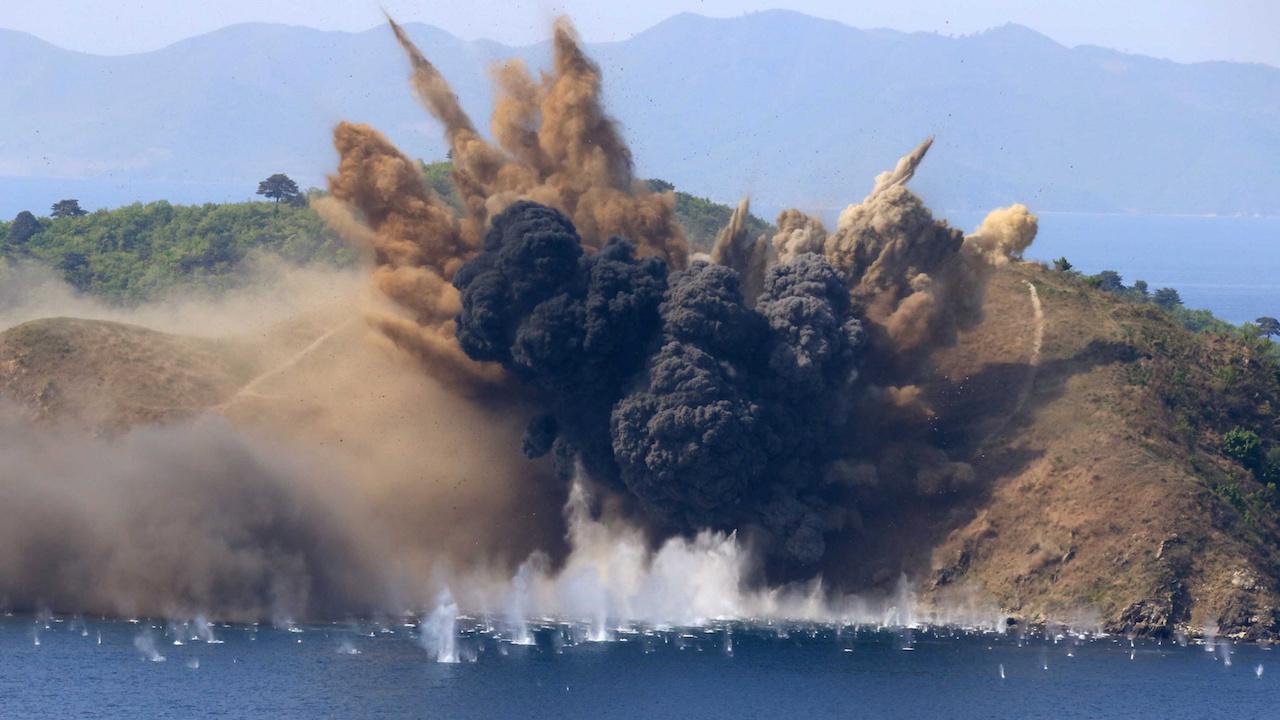China and Russia react to US warnings on North Korea
North Korea's Korean Central News Agency (KCNA) handed out this photo of a military drill marking the 85th anniversary of the establishment of the Korean People's Army (KPA), conducted April 26, 2017.
The United States sounded a global call to action on the North Korean nuclear threat Friday, exhorting Beijing to use its "unique" leverage to rein in Pyongyang and avert "catastrophic consequences."
Addressing the UN Security Council after Donald Trump warned of the risk of a "major conflict" involving the reclusive regime, Secretary of State Rex Tillerson called for an unprecedented campaign of pressure to force the North to change course and put a halt to its nuclear and ballistic missile programs.
"Failing to act now on the most pressing security issue in the world may bring catastrophic consequences," Tillerson told the council. "Business as usual is not an option."
"The threat of a North Korean nuclear attack on Seoul or Tokyo is real, and it is likely only a matter of time before North Korea develops the capability to strike the US mainland," he said.
Tillerson told the council there was "no reason" to think North Korea would change course under the current multilateral sanctions regime, warning: "The time has come for all of us to put new pressure on North Korea to abandon its dangerous path."
"I urge this council to act before North Korea does," he said.
Washington has repeatedly called for tougher UN sanctions, but wants China to take the diplomatic lead by using its leverage over Pyongyang — which Beijing has been reluctant to do for fear of destabilizing North Korea.
In announcing the new campaign, the US top diplomat once more placed the onus squarely on China — which accounts for 90 percent of North Korea's trade — saying it "alone has economic leverage over Pyongyang that is unique" and suggesting sanctions from Beijing would have a strong impact.
Tillerson called on all countries to downgrade diplomatic relations with North Korea and impose targeted sanctions on entities and individuals supporting Pyongyang's missile and nuclear program.
'All options on table'
North Korea is seeking to develop a long-range missile capable of hitting the US mainland with a nuclear warhead, and has so far staged five atomic tests, two of them last year.
The Security Council meeting follows weeks of warnings from the US administration that it will no longer tolerate North Korea's missile launches and nuclear tests.
"All options for responding to future provocation must remain on the table," Tillerson warned.
"Diplomatic and financial levers of power will be backed up by willingness to counteract North Korean aggression with military action, if necessary," he said.
Addressing the Council in turn, Chinese Foreign Minister Wang Yi insisted diplomacy was "the only right choice" and pushed its proposal for reviving talks based on a freeze of North Korea's military programs.
"The use of force does not solve differences and will only lead to bigger disasters," Wang warned.
Wang said China's long-standing proposal for a freeze on Pyongyang's military programs in exchange for halting US-South Korea military drills was "sensible and reasonable."
The United States has rejected the Chinese proposal and insists that North Korea first take steps to show that it is ready to abandon its military programs.
China meanwhile insists it is implementing UN sanctions including two sets of measures imposed last year that put curbs on the coal trade and restrictions on banking.
Russia also chimed in, saying military options to address the threat from North Korea's nuclear and ballistic programs were "completely unacceptable" and would have "catastrophic consequences."
Russian Deputy Foreign Minister Gennady Gatilov told the Security Council that China's proposals to re-start talks with North Korea should be seriously examined and that sanctions alone would not work.
North Korea "is conducting itself in an inappropriate way," Gatilov told the council.
"At the same time, options of using force are completely unacceptable and could lead to catastrophic consequences."
Gatilov said mounting rhetoric and "reckless muscle-flexing" over North Korea could lead to missteps that would have "frightening consequences."
Six sets of sanctions
No resolutions will be adopted at the UN meeting, but it was a chance for United States and its allies to once more put pressure on China.
The Security Council has imposed six sets of sanctions on North Korea — two adopted last year — to significantly ramp up pressure and deny Kim Jong-Un's regime the hard currency revenue needed for his military programs.
But UN sanctions experts have repeatedly told the council that the measures have had little impact on Pyongyang because they have been poorly implemented.
The United States, which holds the council presidency this month, will urge UN member-states to take steps to fully implement the sanctions, the toughest currently to hit any country.
The meeting of the top UN body comes just days after South Korea received the first deliveries of equipment for a new missile defense system from the United States.
China has fiercely opposed the deployment, warning that it will stoke tensions on the peninsula.
Every day, reporters and producers at The World are hard at work bringing you human-centered news from across the globe. But we can’t do it without you. We need your support to ensure we can continue this work for another year.
Make a gift today, and you’ll help us unlock a matching gift of $67,000!
